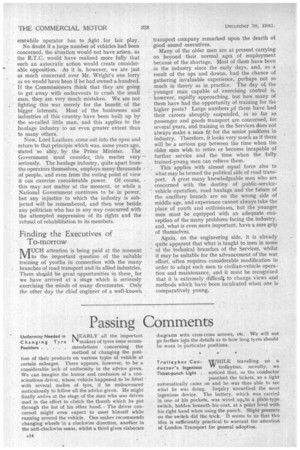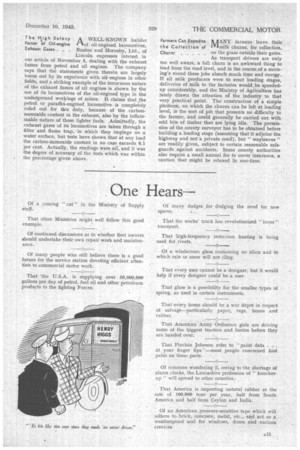Passing Comments
Page 16

Page 17

If you've noticed an error in this article please click here to report it so we can fix it.
Uniformity Needed in KIEARLY all the important Changing Tyre 1 I makers of tyres issue recom
Positions mendations concerning the method of changing the position of their products on various types of vehicle at certain mileages. There appears, however, to be a considerable lack of uniformity in the advice given. We can imagine the horror and confusion of a conscientious driver, whose vehicle happened to be fitted with several makes of tyre, if he endeavoured meticulously to follow all the advice given. He might finally arrive at the stage of the man who was driven mad in the effort to clutch the thumb which he put through the fist of his other hand.. The driver concerned might even expect to meet himself while running around the vehicle. One maker recommends changing wheels in a clockwise direction, another in the anti-clockwise sense, whilst a third gives elaborate diagrams with criss-cross arrows, etc. We will not go farther into the details as to how long tyres should be worn in particular positions.
Trolleybus ConWHILE travelling on a ductor's Ingenious VT trolleybus, recently, we Ticket-punch Light noticed that, as the conductor punched the tickets", so a light automatically came on and he was thus able to see what he was doing. Inquiry unearthed the most ingenious device. The battery, which was carried in one of his pockets, was wired up,,to a plate-type switch, hidden beneath his coat, at a point level with his right hand when using the punch. Slight pressure on the switch did the trick. It seems to us that this idea is sufficiently practical to warrant the attention af London Transport for general adoption. The High Safety A WELL-KNOWN builder Factor of Oil-engine rTh.of oil-engined locomotives, Exhaust Gases . . . Ruston and Hornsby, Ltd., of Lincoln expresses interest in our article of November. 5, dealing with the exhaust fumes from petrol and oil engines. The company says that the statements given therein are largely borne out by its experience with oil...engines in other fields, and a striking example of the innocuous nature of the exhaust fumes of oil engines is shown by the use of its locomotives of the oil-engined type in the undeiground workings of mines. It claims that the petrol or paraffin-engined locomotiveis completely ruled out for Ws duty, because of the carbonmonoxide content in the exhaust, also by the inflammable nature of these lighter fuels. ,Admittedly, the exhaust gases of its locomotives are taken through a filter and flame trap, in which they impinge on a water surface, but tests have shown that at any load the carbon-Monoxide content in no case exceeds 0.1 per cent. Actually, the readings were nil, and it was the degree of accuracy of the tests which was within the percentage 'given above. Farmers Can Expedite NAANY farmers leave their the Collection of Manilk churns, for collection,
Churns . . . . on the grass outside their gates.
As transport drivers are only too well aware, a full churn is an awkward thing to load from the road level, and in the course of a morning's round these jobs absorb much time and energy. If all milk producers were to erect loading stages, deliveries of milk to the factories would be speededup considerably, and the Ministry of Agriculture has lately drawn the attention of the industry to that very practical point. The construction of a simple platform, on which the churns can be left at loading level, is the sort of job that presents no difficulty to the farmer, and could generally be carried out with odd bits of timber that are lying idle. The permission of the county surveyor has to be obtained before building a loading stage (assuming that it adjoins the highway and not 'a private road), but " wayleaves " are 'readily given, subject to certain reasonable safeguards .against accidents. Some county authorities also require a small annual fee to cover insurance, a caution that might be relaxed in war-time. •




















































